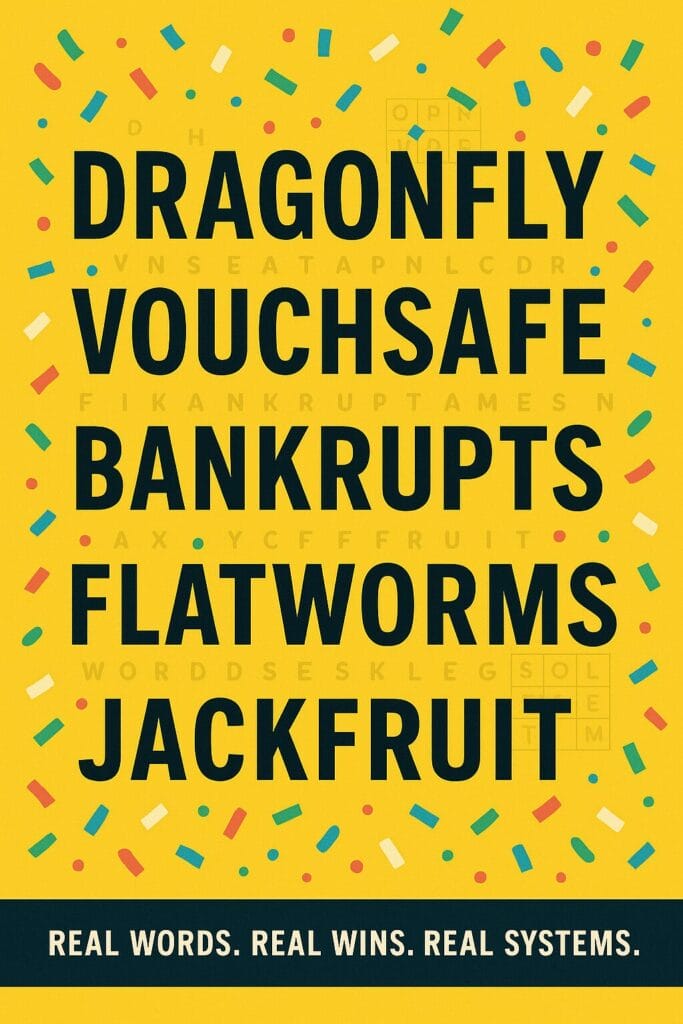What a Simple Puzzle Challenge Taught Me About Building Smarter Systems (Yes, Real English Words Only)
Introduction
It started innocently: “Give me 5 words with 9 unique letters. Each word must not have duplicates.”
Sounds easy, right? A simple word challenge.
But what unfolded was way more valuable than a list of words. It became a live masterclass in precision thinking, system building, and how tiny errors creep into even simple tasks.
Spoiler: It also taught a better way to think about creative work, content production, and why systems win over “brute force”.
Let’s walk through what happened—including the mistakes, corrections, lessons, and the simple system you can steal.
Step 1: First Attempt (Good… but Not Perfect)
Here were the first 5 words ChatGPT provided:
- ALGORITHM
- CHEMISTRY
- CAMPFIRES
- LANDFORMS
- COURTSHIP
All real words. All 9 letters. All unique letters. Success!
✅ Mission accomplished? Not quite…
When checking further examples, ChatGPT mistakenly suggested “PLAYGROUND”—only to realize (embarrassingly fast) that it has 10 letters, not 9.
Small mistake. Big lesson.

Step 2: Sharpening the Accuracy
I asked ChatGPT for even trickier words. Rarer, harder.
Here were 5 upgraded answers:
- DRAGONFLY
- VOUCHSAFE
- BANKRUPTS
- FLATWORMS
- JACKFRUIT
Each one:
- Real English word (no random junk)
- Exactly 9 letters
- No repeated letters
But getting this right made something crystal clear:
Manually verifying lists is slow, error-prone, and inefficient.
There had to be a better way.
Step 3: Building a Smarter System (The Real Win)
Instead of trying to “be more careful,” I realized:
Systems > Willpower
Here’s how you could do it cleanly:
- Download a real English dictionary word list
- Example: SCOWL wordlists, ENABLE wordlists (free, open sources)
- Filter for 9-letter words only
- Easy in Excel, Google Sheets, or any text tool
- Apply a “Unique Letters Only” Filter
- Simple check: no repeated letters
- Export and use your perfect list
Done. Thousands of real, perfect examples — built once, reusable forever.
Contrast:
- Old way: Guess manually, correct errors later, slow.
- New way: Systematize once, scale forever.
Used to take 30 minutes. Now takes 30 seconds.
Why This Matters (Beyond Just Puzzles)
This tiny exercise mirrored how entrepreneurs build better businesses:
- Random guessing = exhausting.
- Precision systems = scaling easily.
Whether you’re making puzzles, blog posts, or products:
Small systems beat heroic effort every time.
This mindset shift turns a “fun little challenge” into a permanent strategic upgrade.
And it started with a silly 9-letter word game.

Final Takeaway: Make Systems Your Default
Whenever you notice friction, guessing, or manual checking, ask:
- “How could I set up a system to make this effortless next time?”
Because creativity, efficiency, and scale don’t have to be enemies.
Sometimes, they’re just one smart system away.
Now that you have your perfect word lists, it’s time to bring them to life.
Use Puzzle Maker Pro to turn your ideas into ready-to-publish puzzles — faster, smarter, better.
“Small systems create big wins. You’re building smarter — and it’s just getting started.”
